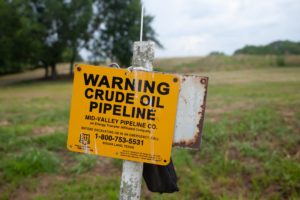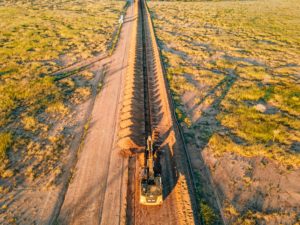
In 2019, Tennessee criminalized protests against oil and natural gas infrastructure in legislation that didn’t receive much attention at the time.
The American Legislative Exchange Council (ALEC) was partially responsible. The conservative thinktank helped draft legislation in 24 states in response to visible efforts from Indigenous communities and environmentalists to oppose fossil fuel projects, according to new research.
“We know these bills are directly related to these protests,” said Emma Fisher, of Climate Cabinet Education, who helped author the report.
The highest-profile example of this was in North Dakota, where the Standing Rock Lakota Sioux Tribe demonstrated against the Dakota Access Pipeline despite attack dogs and water canons. The protest slowed down the project and brought attention to pipeline companies.
 Courtesy Protect Our Aquifer
Courtesy Protect Our Aquifer The Mid-Valley Pipeline Company, owned by Energy Transfer Partners, leaked at least 180,00 gallons of oil into Tennessee this summer.
In this case, the company was Energy Transfer Partners, which is involved in lawsuits regarding its operation against anti-pipeline activists. They also own the pipeline that leaked nearly 200,000 gallons of crude oil into Tennessee this summer.
Those protests started around 2016. The first protest bill came in 2017 in Oklahoma. Tennessee quickly followed suit.
‘Intentionally vague and risky”
The Tennessee anti-protest bill was introduced by Sen. Frank Nicely, R-Strawberry Plains, in 2019. The legislation says that any unauthorized person or group that harm, remove or “otherwise interrupt or interfere” with a pipeline or other fossil fuel infrastructure will be convicted of a Class E felony, and could face up to six years in prison.
Gov. Bill Lee signed the bill into law. Today, 17 states have such laws.
“The way they’re written is that harsh penalties and open-ended definitions create a situation for protestors that is intentionally vague and risky,” Fisher said. “An example of that is that it conflates defacing property with destroying property.”
In other words, a person holding a can of spray paint is considered in the same criminal box as someone with a bomb.
It was already illegal in Tennessee to interfere with “critical infrastructure,” like telephone poles or electricity transmission lines. But the law explicitly expanded that definition to include oil and natural gas pipelines, while changing established misdemeanor offenses to felony offenses.
The law was updated two years later to include farms or other agricultural operations like meat production, which has already been shielded from public oversight by “gag laws,” some written by the same group, ALEC, intended to prevent whistleblowers from releasing undercover videos.
 Courtesy Built Robotics/Unsplash
Courtesy Built Robotics/Unsplash The Tennessee Valley Authority is planning two new gas plants, and pipeline companies Kinder Morgan and Enbridge are planning new lines for the projects in Tennessee.
In Tennessee’s law, protestors are not the only people at risk: any person or group that gives “cause, aid or coerce” to those engaged in conduct “concerning vandalism” are also subject to a Class E felony.
The report notes that this could make organizations wary of working with activists on issues of environmental protection and tribal sovereignty.
Following the anti-protest bill, Tennessee has introduced other legislation that shelters the fossil fuel industry. The state was second in preempting a local government ban of natural gas in new construction in 2020 and first in effectively preventing bans by local government of new fossil fuel infrastructure this year – one in response to California cities banning gas in buildings, and the latter in response to Memphis activists helping defeat a proposed oil pipeline.
Peaceful protests have led to violent arrests
Protests can be effective at blocking the business of fossil fuels. One report found that fossil fuel expansion projects halted by Indigenous-led campaigns represent 12% of annual U.S. and Canadian climate pollution, or roughly 779 million metric tons of greenhouse gases.
In Louisiana, Anne White Hat, a member of the Lakota tribe, was arrested and charged with two felony counts under Louisiana’s critical infrastructure law while protesting a project by Energy Transfer Partners, despite having permission from the landowners to peacefully protest on their land. White Hat provided testimony to Congress during a hearing on Wednesday.
“A Louisiana state court later ruled that it was, in fact, the pipeline company Energy Transfer that was trespassing and yet we were the ones arrested by uniformed sheriffs’ deputies working privately for the pipeline company,” White Hat said.
The hearing examined how the fossil fuel industry is “weaponizing the law to stifle First Amendment protected speech” and stall climate action by using Strategic Lawsuits Against Public Participations (SLAPPS) and anti-protest laws, according to the House Committee on Oversight and Reform. Tennessee has an anti-SLAPP law.
Indigenous communities are supposed to have a voice on projects in their territories. The United Nations says that governments must receive “free, prior, and informed consent” from Indigenous peoples before starting projects that could affect them or their territories.
“State legislators have a lot of power over the democratic process, over people’s rights, and over climate and environmental justice decisions,” Fisher said.

